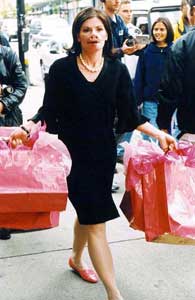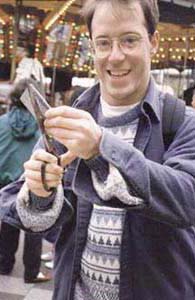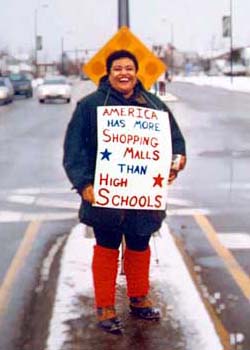|
When labour is free, it is forced. When labour is cheap it is nasty. However, raw commerce is indifferent to everything that does not appear on a balance sheet and thus the imposition of laws and practices by agencies and individuals that introduces social and environmental parameters that would otherwise be absent from doing business. If governments and well-informed consumers are weak or few in number then trade and commerce quickly becomes dominated by the bottom-feeders of society, the money-first nexus. In New Zealand over the last 15 years successive weak governments have allowed raw commerce of any origin to have its way. New Zealanders too have largely succumbed to the lure of low prices and a `don't want to know' attitude as to how those low prices were costed. The crazy thing is, low prices set by importers using grossly exploited labour rapidly erodes the working conditions and quality of life of New Zealanders. The so-called success of businesses like The Warehouse and MacDonald's to name the two most obvious ones is a very one-sided affair. The owners of the business profit while everybody else pays. Unless and until people have a more wholestic understanding of economics and their part in it we will be our own worst enemies. The Buy Nothing Day movement is about that, raising awareness. A little bit of thought goes a long way. Understanding more about the product, the producer and the source of materials is an essential ingredient to life today. It is the information age, the dumb dollar brings with it very high sociala nd environmental costs. Below is an extreme example of what not to buy and why. But to this day many products from S.E. Asia, South America, Indian sub-continent and even Europe are cheap because they the environment and people are paying an unsustainable price. The all-out propaganda war for `the global economy' is all about pushing trade between countries because it is trade that allows super-exploitation to yield super-profit. Contrariwise, it is self-sustainability of a nation that rewards people who work, people who want quality of life and who want to leave their social and natural environment in as good a state as they found it. Don't buy into the global economy if you value your local economy. Despite a decade of evidence that goods manufactured in Chinese and Tibetan forced labour camps are being exported to the West, the practice continues. New Zealand now needs guarantees that products we import do not come from these camps. John Howard writes. Although there have been some societal advances in the People's Republic of China, the politicians in Beijing continue to depend upon its Laogai system as a tool for oppression - despite its forthcoming entry into the WTO. Laogai, (prison) is a Mandarin term that translates literally as meaning reform-through-labour. But within China the term has come to have a wider colloquial meaning. According to the US-based Laogai Research Institute, there remains, as at 5 September 2000, 1200 forced labour camps in 31 Chinese provinces' including Tibet. In China, the word Laogai can strike fear in the hearts and minds of the average Chinese person. Whether individuals are thrown in prison (jianyu) reform-through-labour camps (laogai dui) re-education through labour camp (laojiao suo) juvenile offender facility (shaoguan suo) or a county detention centre (kanshou suo) they are deprived of their freedom. They are prisoners by any common sense definition. Citizens of China can still be punished for exercising their internationally recognised human rights or may be convicted during political campaigns or through procedures that violate standards of legal fairness. There are good reasons why western countries should not import products from countries with forced labour camps. (a)from a human rights perspective a system of forced labour breeds extreme dehumanisation as prisoners are nothing more than tools for their labour (b) it is illegal by international law to import any product that is produced in whole or in part by prison labour, and beyond that, ( c) forced labour of any kind upsets the balance of trade by allowing one economy an advantage, as it is not required to pay its labourers for their services and (d) an importer of products from forced labour camp countries can gain a financial advantage. According to the Laogai Research Institute, few government requests for investigation or visitation to confirm the source of goods receive prompt cooperation from the Chinese Ministry of Justice. Some requests for visitation can take eighteen months and even then, the precise meaning and language of the request can be debated at length. In the US, the Clinton administration policy was to separate human rights matters from Most Favoured Nation status which is currently enjoyed by China - even before there was time for attempts at enforcement of a memorandum of understanding about forced labour which had been signed between the two countries. In many cases Chinese officials either cannot, or will not, substantiate claims that exports and products intended only for domestic consumption are seperated. One well-known case where evidence could not be provided was that of Zhejiang No. 4 Prison otherwise known as Hanzhou Wulin Machinery Factory. There are many other cases where the Chinese could not provide evidence to substantiate their claims that products for export were being made purely by civilians working in a prison factory. Two such cases were; Beishu Shengjian Graphite Mine and Hangzhou Qianjiang Hardware Tool Plant. There are many other documented cases that reveal that even US government agencies are at fault when, after receiving denials from Chinese government officials, no further investigation or visitation efforts were made. In global business directories companies are listed which seek to export their products abroad. Known Laogai forced labour camps appear. If New Zealand is serious about enforcement of laws relating to human rights and moreover, if we are serious about maintaining the standards of fairness in free trade, then it is necessary to draft proper and enforceable rules. On the other hand if China is serious about observing its trade agreements and enhancing its human rights record, then it must demonstrate a willingness and determination to immediately abolish forced labour camps. In the meantime, when products enter New Zealand, the Government must insist on written guarantees that imported products are not sourced from forced labour camps. If that guarantee is not forthcoming the product should be detained. And even when guarantees are provided, New Zealand must retain the right to investigate claims and also insist on visitation rights to the country of origin to confirm the claims. Without that, free trade is a myth. In the final analysis it is up to each caring New Zealander, as consumers, to ask a simple question of retailers. "Can you guarantee that this product is not made by or sourced from a country who operates forced labour camps?"
|



